|
You
are here: /main/video/
Video
The
videos are best played with the QuickTime 7 viewer or
plugin, which you can get here.
The videos are also large in size, so please be patient.
If you do not have a fast connection like DSL or Cable
it may take several minutes to download.
July 2007 Expedition
NOW-RAMP 2002 Expedition
Video Reports
These videos are all in MPEG-4 format. They
are courtesy of Bishop Museum and NASA.
|
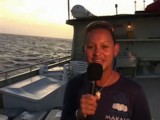 Departure,
9/8/02 - Bonnie Kahape'a describes the
huge job of loading the R/V RAPTURE (our ship). The
video concludes with departure ceremonies. [10.52MB] Departure,
9/8/02 - Bonnie Kahape'a describes the
huge job of loading the R/V RAPTURE (our ship). The
video concludes with departure ceremonies. [10.52MB]
|
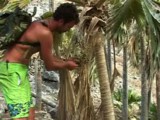 Nihoa,
9/9/02 - Bonnie Kahape'a and Alex Webman
report on the unique birds and plants of Nihoa,
and the threat posed by invading grasshoppers. Hear about
how caretakers are restoring native plants. [14.06MB] Nihoa,
9/9/02 - Bonnie Kahape'a and Alex Webman
report on the unique birds and plants of Nihoa,
and the threat posed by invading grasshoppers. Hear about
how caretakers are restoring native plants. [14.06MB] |
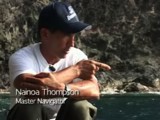 Mokumanamana,
9/10/02 - Bonnie Kapahe'a and Nainoa Thompson
describe the difficulty of landing on Mokumanamana;
Scott Kikiloi interprets evidence of ancestral occupation,
and Beth Flint tells us about delicate balance in the
the native bird population. [19.56 MB] Mokumanamana,
9/10/02 - Bonnie Kapahe'a and Nainoa Thompson
describe the difficulty of landing on Mokumanamana;
Scott Kikiloi interprets evidence of ancestral occupation,
and Beth Flint tells us about delicate balance in the
the native bird population. [19.56 MB] |
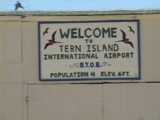 Tern
Island , 9/11/02 - This island, once a World
War II refueling airport in the French
Frigate Shoals, is now a nesting ground for over a
million sea birds. Some of these birds can fly for 9 months
without stopping! [21.46 MB] Tern
Island , 9/11/02 - This island, once a World
War II refueling airport in the French
Frigate Shoals, is now a nesting ground for over a
million sea birds. Some of these birds can fly for 9 months
without stopping! [21.46 MB] |
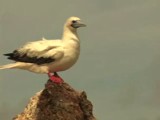 Wildlife
with Slack Key, 9/12/02 - Sit back, relax,
and enjoy a video collage of the diverse and beautiful
wildlife we've encountered the last few days, set to slack
key guitar. [22.42 MB] Wildlife
with Slack Key, 9/12/02 - Sit back, relax,
and enjoy a video collage of the diverse and beautiful
wildlife we've encountered the last few days, set to slack
key guitar. [22.42 MB] |
| |
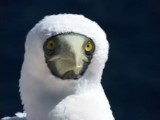 Gardner
Pinnacles, 9/14/02 - Visiting Gardner
Pinnacles, the last basalt island as one travels northwest
up the island chain, the next generation of caretakers
of the NWHI find inspiration for their kuleana (responsibility).
[21.67 MB] Gardner
Pinnacles, 9/14/02 - Visiting Gardner
Pinnacles, the last basalt island as one travels northwest
up the island chain, the next generation of caretakers
of the NWHI find inspiration for their kuleana (responsibility).
[21.67 MB] |
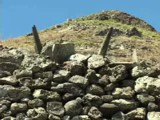 Ancestral
Life on Nihoa, 9/15/02 - We look at evidence
of a thriving Polynesian community on Nihoa.
Where did they get their water and what did they eat on
this small and rocky island? [29.03 MB] Ancestral
Life on Nihoa, 9/15/02 - We look at evidence
of a thriving Polynesian community on Nihoa.
Where did they get their water and what did they eat on
this small and rocky island? [29.03 MB] |
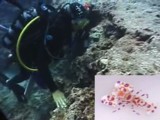 Diving
for Invertebrates, 9/16/02 - After the 1923
Tanager expedition, no systematic study of invertebrates
was undertaken for 77 years, until the NOW-RAMP 2000 Expedition.
Now we're back to discover more unusual invertebrate inhabitants.
Dive with the scientists and see what they find! [21.68
MB] Diving
for Invertebrates, 9/16/02 - After the 1923
Tanager expedition, no systematic study of invertebrates
was undertaken for 77 years, until the NOW-RAMP 2000 Expedition.
Now we're back to discover more unusual invertebrate inhabitants.
Dive with the scientists and see what they find! [21.68
MB] |
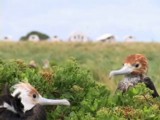 Laysan
Island: Is Environmental Restoration Possible?, 9/17/02
- Laysan was devastated
by commercial activity starting in the late 1800's. Although
we can never restore the endemic Laysan species that are
now extinct, Laysan is being restored to a natural state
through the efforts of dedicated individuals and agencies
and the application of scientific knowledge. [28.97 MB] Laysan
Island: Is Environmental Restoration Possible?, 9/17/02
- Laysan was devastated
by commercial activity starting in the late 1800's. Although
we can never restore the endemic Laysan species that are
now extinct, Laysan is being restored to a natural state
through the efforts of dedicated individuals and agencies
and the application of scientific knowledge. [28.97 MB] |
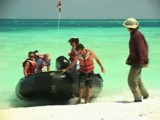 Castaway!
Pearl and Hermes Atoll, 9/18/02 - Only 6
feet above sea level, the land at Pearl
and Hermes Atoll is entirely washed over during heavy
storms. Yet, two biologists will camp here alone for 11
days, assessing the bird and plant populations and eradicating
invasive species. [22.81 MB] Castaway!
Pearl and Hermes Atoll, 9/18/02 - Only 6
feet above sea level, the land at Pearl
and Hermes Atoll is entirely washed over during heavy
storms. Yet, two biologists will camp here alone for 11
days, assessing the bird and plant populations and eradicating
invasive species. [22.81 MB] |
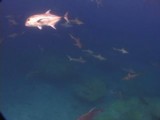 Navigating
Change , 9/20/02 - By bringing together science
and culture in one package, we can begin to bridge together
people of diverse backgrounds into one common cause to
save our island home. This video premiered at the grand
opening of the "Navigating Change" exhibit at
the Hawai`i Maritime Center, 9/20/02. [32.95 MB] Navigating
Change , 9/20/02 - By bringing together science
and culture in one package, we can begin to bridge together
people of diverse backgrounds into one common cause to
save our island home. This video premiered at the grand
opening of the "Navigating Change" exhibit at
the Hawai`i Maritime Center, 9/20/02. [32.95 MB] |
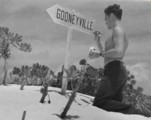 Midway
, 9/23/02 - Midway
is one of the most heavily impacted islands in the NWHI.
This video summarizes the history of occupation and changing
attitudes. [13.81 MB] Midway
, 9/23/02 - Midway
is one of the most heavily impacted islands in the NWHI.
This video summarizes the history of occupation and changing
attitudes. [13.81 MB] |
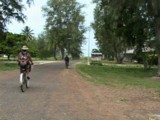 Mini-community
on Midway, 9/24/02 - Only 20 people live
on Midway Island, but
form a complete and mutually interdependent community,
including a "mall," hospital, fire department,
and elementary school where two girls are taught by their
mom! [23.74 MB] Mini-community
on Midway, 9/24/02 - Only 20 people live
on Midway Island, but
form a complete and mutually interdependent community,
including a "mall," hospital, fire department,
and elementary school where two girls are taught by their
mom! [23.74 MB] |
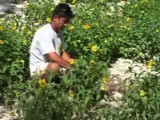 Weeding
the Wilderness on Kure, 9/25/02 - Why is
this man pulling up plants on Kure,
the northernmost Hawaiian Island and the northernmost
coral atoll in the world? Is he mad? Find out how even
daisies can threaten the natural balance. [14.8 MB] Weeding
the Wilderness on Kure, 9/25/02 - Why is
this man pulling up plants on Kure,
the northernmost Hawaiian Island and the northernmost
coral atoll in the world? Is he mad? Find out how even
daisies can threaten the natural balance. [14.8 MB] |
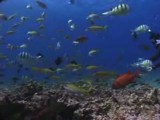 Let's
Get Wet!, 9/26/02 - NOW-RAMP researchers
are documenting the diversity and abundance of sea life
in the Northwestern Hawaiian Islands so that we will have
the knowledge needed to better manage these islands for
future generations. Let's go underwater and see what they
are seeing. [21.4 MB] Let's
Get Wet!, 9/26/02 - NOW-RAMP researchers
are documenting the diversity and abundance of sea life
in the Northwestern Hawaiian Islands so that we will have
the knowledge needed to better manage these islands for
future generations. Let's go underwater and see what they
are seeing. [21.4 MB] |
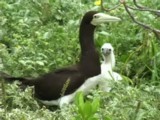 Weeding
Boobie Nests, 9/27/02 - Now the NOW-RAMP
team pitches in to weed invasive plants from two acres
of Kure Atoll, so that
Brown Boobies and other birds may nest. [19.36 MB] Weeding
Boobie Nests, 9/27/02 - Now the NOW-RAMP
team pitches in to weed invasive plants from two acres
of Kure Atoll, so that
Brown Boobies and other birds may nest. [19.36 MB] |
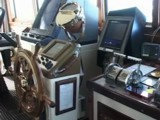 Last Voyage of the Townsend Cromwell, 9/30/02
- The Townsend Cromwell, named after an oceanographer,
has been conducting research voyages 250 days a year for
the last 39 years. Its present voyage to the NWHI will
be its last, as it is scheduled to be decommissioned on
October 10th. [19.2 MB]
Last Voyage of the Townsend Cromwell, 9/30/02
- The Townsend Cromwell, named after an oceanographer,
has been conducting research voyages 250 days a year for
the last 39 years. Its present voyage to the NWHI will
be its last, as it is scheduled to be decommissioned on
October 10th. [19.2 MB] |
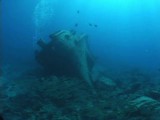 Shipwrecks!, 10/01/02 - The NOW-RAMP Maritime
Archeology researchers have visited over 15 wreck sites
in the NWHI, including one of the earlliest shipwrecks
in Hawai`i. Not only ships, but also airplanes! See these
unusual videos of selected discoveries. [16.54 MB]
Shipwrecks!, 10/01/02 - The NOW-RAMP Maritime
Archeology researchers have visited over 15 wreck sites
in the NWHI, including one of the earlliest shipwrecks
in Hawai`i. Not only ships, but also airplanes! See these
unusual videos of selected discoveries. [16.54 MB] |
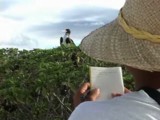 Scoping Lisianski Birds, 10/02/02 - The team
conducts a bird population survey on Lisianski
Island. Baseline data is important for management
of refuge wildlife. A "burrow scope" is used
to inspect underground nests. [16.68 MB]
Scoping Lisianski Birds, 10/02/02 - The team
conducts a bird population survey on Lisianski
Island. Baseline data is important for management
of refuge wildlife. A "burrow scope" is used
to inspect underground nests. [16.68 MB] |
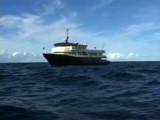 The Good Ship R/V RAPTURE, 10/03/02 - This
ship, our home for 27 days, was designed to provide educational
opportunities for youth at sea. It serves over 6000 students
each year. Visit www.rapture.cc
to find out more. [19.29 MB]
The Good Ship R/V RAPTURE, 10/03/02 - This
ship, our home for 27 days, was designed to provide educational
opportunities for youth at sea. It serves over 6000 students
each year. Visit www.rapture.cc
to find out more. [19.29 MB] |
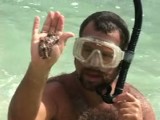 Intertidal Zones, 10/07/02 - Visit the intertidal
zones at French Frigate Shoals. The intertidal zones of
the NWHI hold more biomass than the main Hawaiian islands.
[17.81 MB]
Intertidal Zones, 10/07/02 - Visit the intertidal
zones at French Frigate Shoals. The intertidal zones of
the NWHI hold more biomass than the main Hawaiian islands.
[17.81 MB] |
| |
|
Video
Library
A
collection of related videos of interest.
| 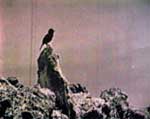 1923
Tanager Expedition - In
1923 the minesweeper USS Tanager took a scientific expedition
to survey the Northwestern Hawaiian Islands, and record
archaeological, meterological and biological data. Donald
R. Dickey was the cinematographer on the voyage and
on the following page are a few short video clips from
the film of the voyage. 1923
Tanager Expedition - In
1923 the minesweeper USS Tanager took a scientific expedition
to survey the Northwestern Hawaiian Islands, and record
archaeological, meterological and biological data. Donald
R. Dickey was the cinematographer on the voyage and
on the following page are a few short video clips from
the film of the voyage.
|
| 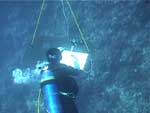 Towboarding
- a means of quickly surveying a large and shallow marine
area. Divers cover roughly 3 km or 1.8 miles per dive.
Digital video cameras are attached to the board, with
down facing cameras surveying the bottom type and foreward
tilted cameras capturing a broader picture of habitat
composition. Towboarding
- a means of quickly surveying a large and shallow marine
area. Divers cover roughly 3 km or 1.8 miles per dive.
Digital video cameras are attached to the board, with
down facing cameras surveying the bottom type and foreward
tilted cameras capturing a broader picture of habitat
composition.
|
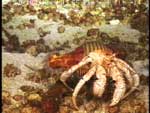 Hawai‘i
Undersea Research Laboratory (HURL) - Strange
and eerie images from the deep sea. HURL uses special
sumbmarines to explore deep sea habitats and the odd creatures
that live there. Hawai‘i
Undersea Research Laboratory (HURL) - Strange
and eerie images from the deep sea. HURL uses special
sumbmarines to explore deep sea habitats and the odd creatures
that live there. |
| |
 Talk About It! Talk About It!
How can I get a copy of the video?
Asked by Pomai from Kamehameha Schools on Jul 12, 2006.
Aloha! I was wondering if I could get a copy of the video clip entitled "Wildlife with Slack Key". I am an alaka'i for the 7th grade orientation and I wanted to use a portion of the video for the welcome video, being that the theme of the orientation is the iwa bird. Could you please get back to me? I am more than willing to pay for a copy of the video. Mahalo!
Answered by Dan from University of Hawaii on Jul 12, 2006.
If your Internet connection is fast enough to play the video you should be able to download it. Just right-click (or control-click on a Mac) on the image that starts the video. You should get a menu with an option to download it. If that does not solve your problem then email us directly. |